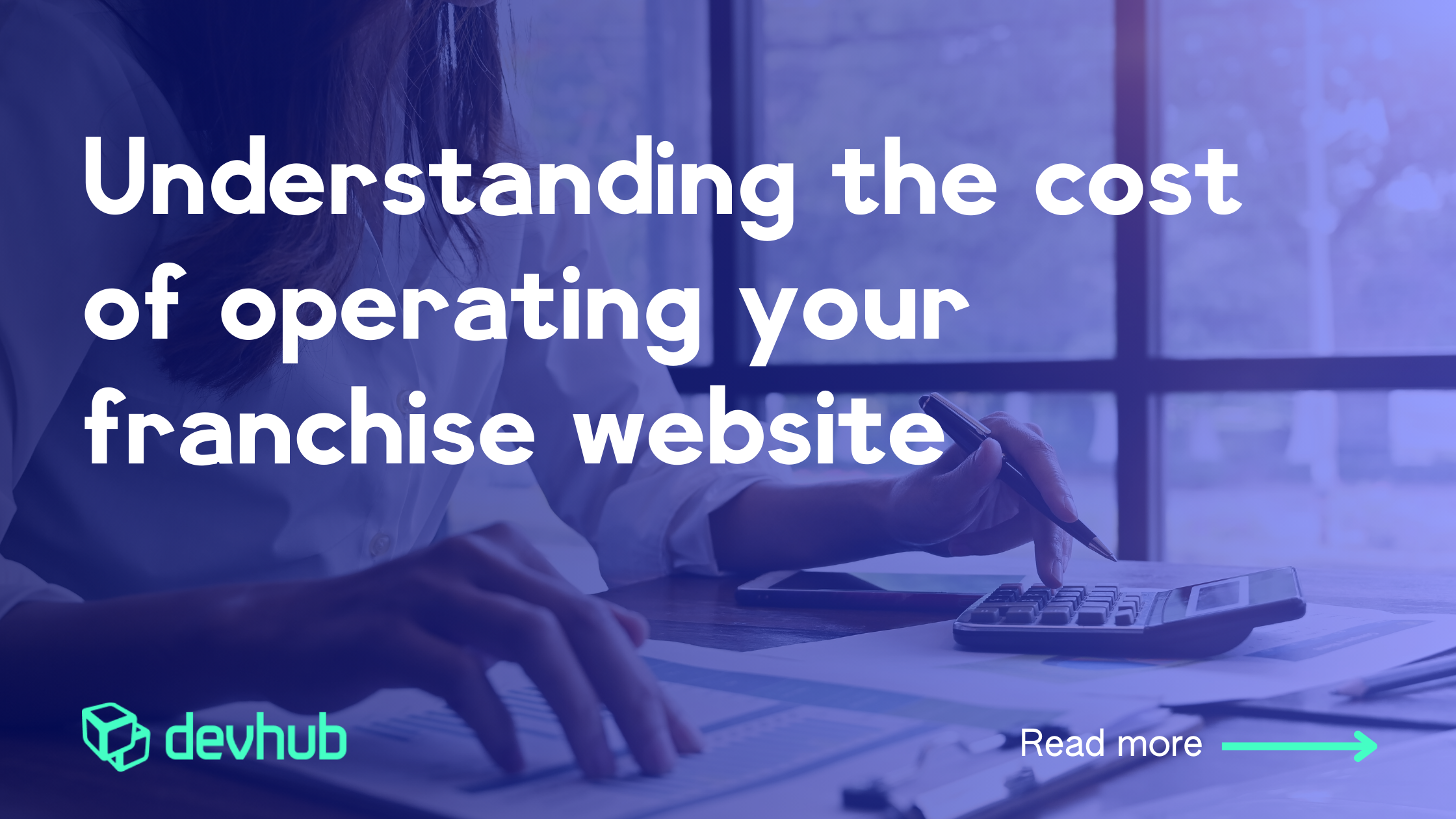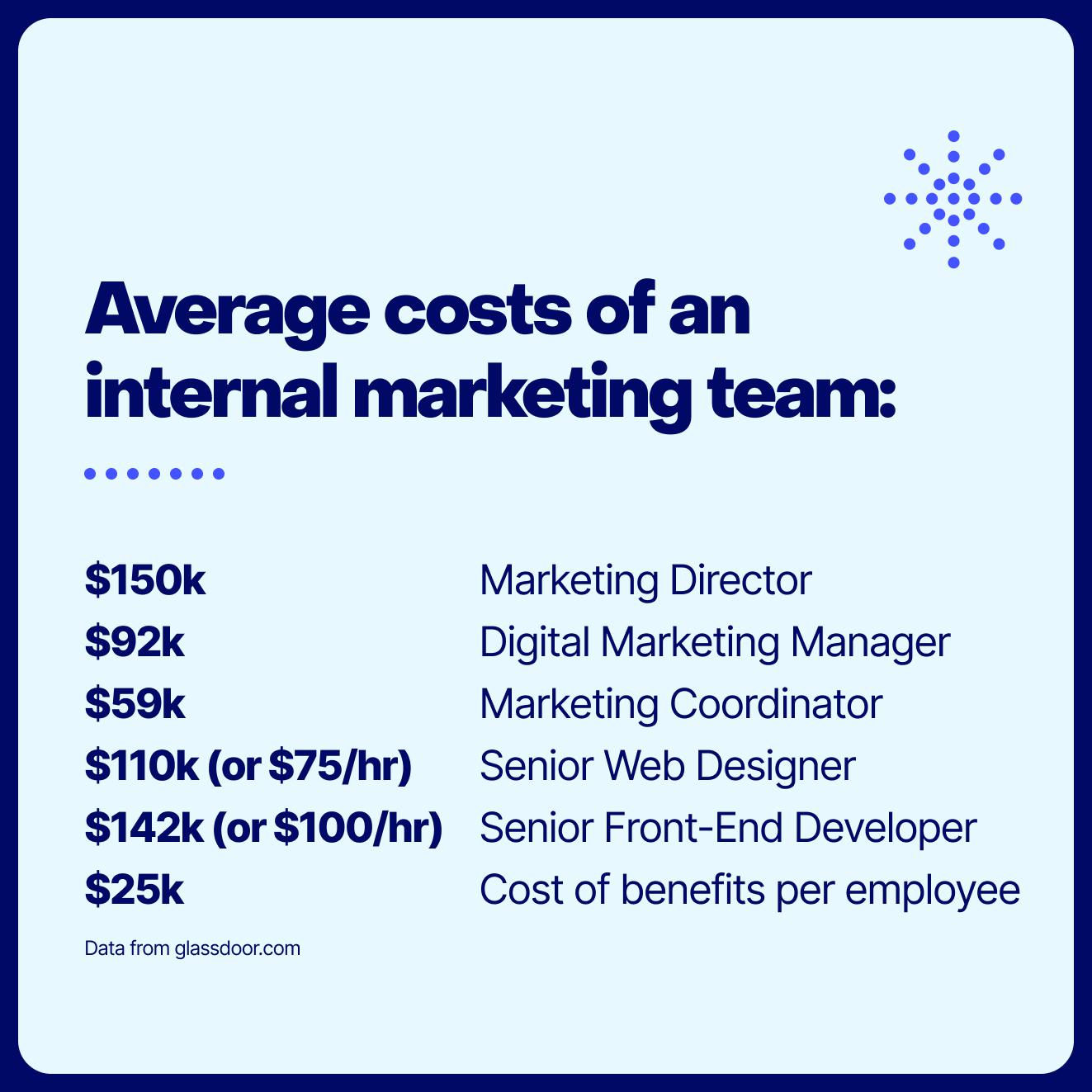
At the heart of your franchise’s digital marketing strategy lies your core presence: your website. It’s not only the central hub of your connection with customers, but it’s also a place to show off all your brand has to offer.
With such a valuable asset, it’s crucial to understand all the costs involved - from development and design to hosting and ongoing maintenance. Of course, it all largely depends on how you decide to implement it.
Will you do it all in-house? Will you bring on an agency partner? Which platform will you use? Which integrations do you need?
To fully understand the cost of your franchise website, you must first understand what it takes to have a successful one.
Cost of Building
The bulk of the cost of any website is for two major components: People and technology. The first cost you’ll come across is a one-time implementation fee, which covers the buildout of your website.
Even with established brands, this process is no small feat. You’ll need a strong team - internally or externally - of designers and developers who can build a site with the structure and features for your brand’s specific needs.
The cost of building ultimately comes down to time. Agencies and developers will either charge a set hourly rate or a fixed project fee based on the amount of projected hours it will take them. Meanwhile, developing a website in-house may mean hiring a developer, designer, content writers, and a team to oversee and update the website regularly.
Cost of Hosting
Another cost when it comes to your website is the cost of hosting. This can vary greatly depending on which type of hosting is chosen.
One option is to choose a dedicated server, in which that entire server will be focused on your website. This allows for plenty of customization and strong website performance. It also has extensive, reliable capabilities that can keep up with your brand as you scale - giving you the “best of the best” when it comes to your site.
Shared hosting is a more budget-friendly, middle option, where multiple websites share the same server resources, but performance may not always be as strong. You may also find that you need more customization, stability, and support as you scale.
Finally, in-house hosting means you’ll manage your servers, both during your website’s initial launch and for all ongoing maintenance. This is where some brands choose to start, but with the maintenance, costs, and reliability required as they grow, they quickly find their needs outgrow their website’s capabilities.
Cost of People
Depending on the size of your franchise, you may have a few people on your marketing team, or you may be the marketing team. Some brands consider hiring designers and developers in-house, while others partner with agencies and work hand-in-hand to keep their websites updated and performing well.
Some things to consider before hiring in-house include overhead costs: from recruitment costs to onboarding resources, any technology they’ll need, and benefits such as health insurance, life insurance, and retirement plans.

Cost of Ongoing Maintenance
If there is one important thing to understand about your franchise website, it’s that it is not a “one and done” project. With constant updates from Google, ADA guidelines, and new franchisees or landing pages being added, it’s vital to invest in a website built to scale.
Seemingly small updates like swapping out images or adding new integrations can be both costly and time-consuming, whether through your internal team or a partner. Search Engine Optimization is also an ongoing process, and keeping up with it ensures your sites will continue to rank well in their markets.
Reliability and Performance Tracking
Choosing a reliable host and team to manage your website is key to franchisee success. When your website, or a part of it, is down, you and your franchisee are missing out on leads - and ultimately, revenue.
Think of it this way: There are 8,760 hours in a year. If your website is 99% reliable, that’s still 87.6 hours that your website could be down, per year. Even if a franchisee averages one lead per hour from your website, 87 leads would be lost for the year (and likely go to a competitor).
Justifying the Cost to Your Stakeholders
Given that the cost of a reliable website, technology, and people to keep its performance strong is a wise investment for your franchise brand, you may be wondering how to best present the idea to your stakeholders.
A great way to do this is through an RFP, or Request for Proposal. Your RFP for a new website should include:
-
Introduction
-
Why do you need a new website?
-
Why is now the right time?
-
What are the desired outcomes and benefits of a new website?
-
-
Background Information
-
What are the challenges or limitations with your current CMS?
-
What areas could a new CMS improve (when it comes to franchisee support, SEO and performance, lead generation, content, design, or functionality?)
-
-
Scope of Work
-
What integrations does your brand need?
-
What special features would benefit you and your franchisees?
-
What kind of flexibility and customization are needed as your brand scales?
-
What is needed to migrate off your current CMS?
-
-
Proposal Submission Guidelines
-
When is the deadline for proposals?
-
In what format should the proposals be submitted?
-
Who will be the point of contact for those looking to submit a proposal?
-
-
Evaluation Criteria
-
What factors will your team use to decide on a proposal?
-
Which parties will be involved in the decision?
-
-
Timeline and Conditions
-
What are some key dates or milestones in this RFP process, including the selection date and anticipated contract start date?
-
What steps are required?
-
What expectations are there for an agreement upon selection?
-
Selecting a Partner You Can Count On
When it comes to choosing any supplier for your franchise brand, the best way to approach your decision is to do your homework. For your website, look into different CMS platforms, review their testimonials, sign up for a demo, and request real examples and analytics from sites they’ve built.
Want to learn more about the difference switching CMS platforms can make for your franchise? Schedule a demo today to share more about your brand’s specific needs.